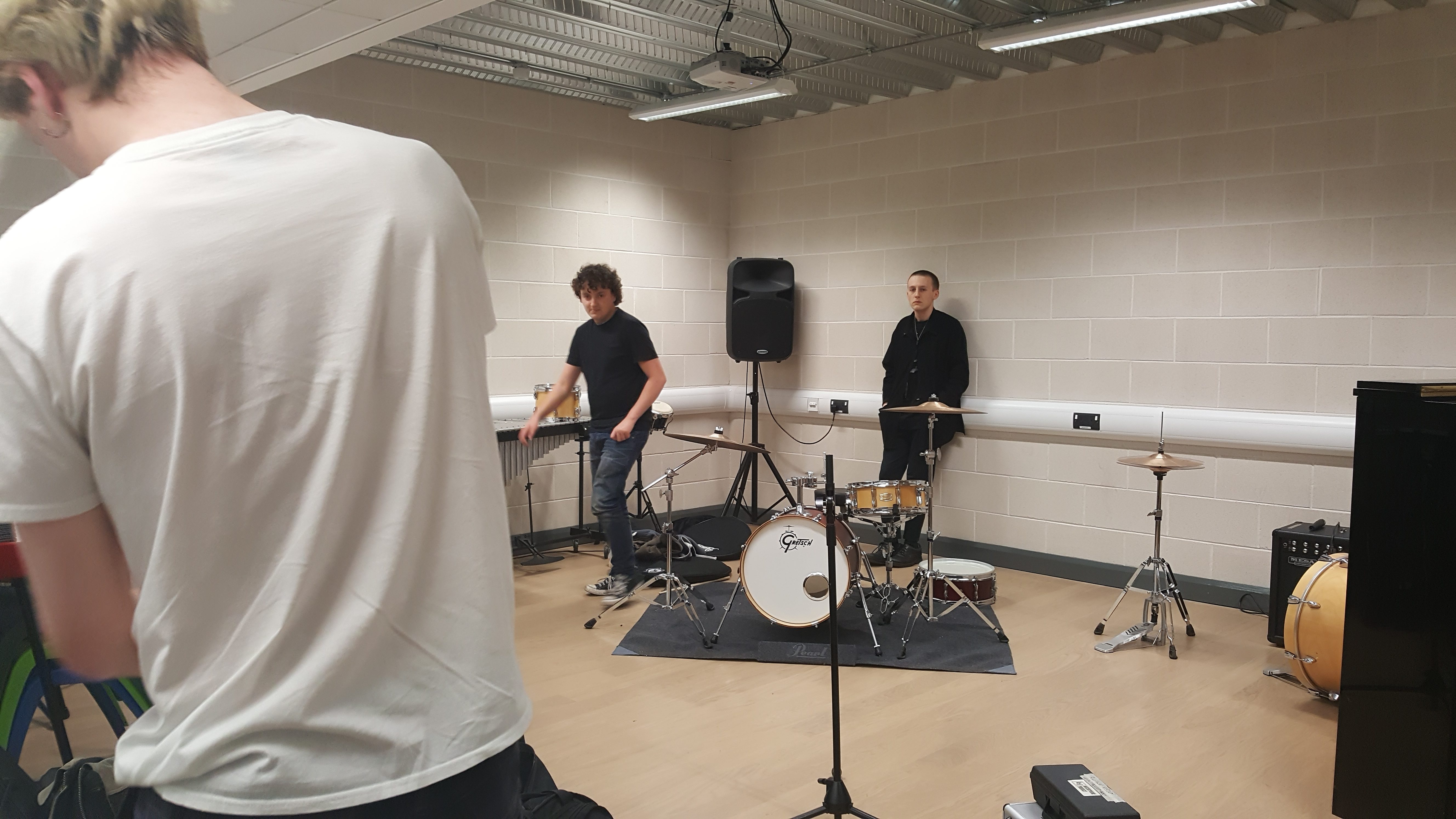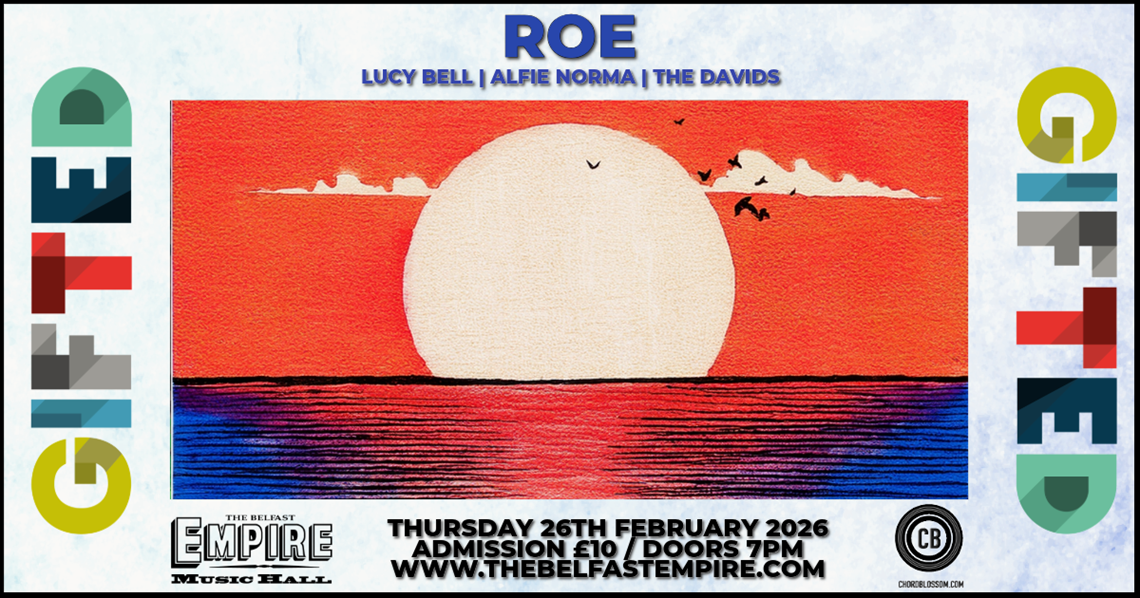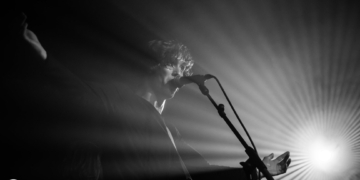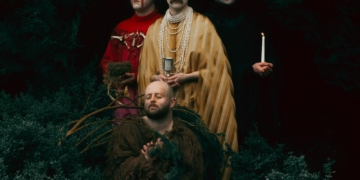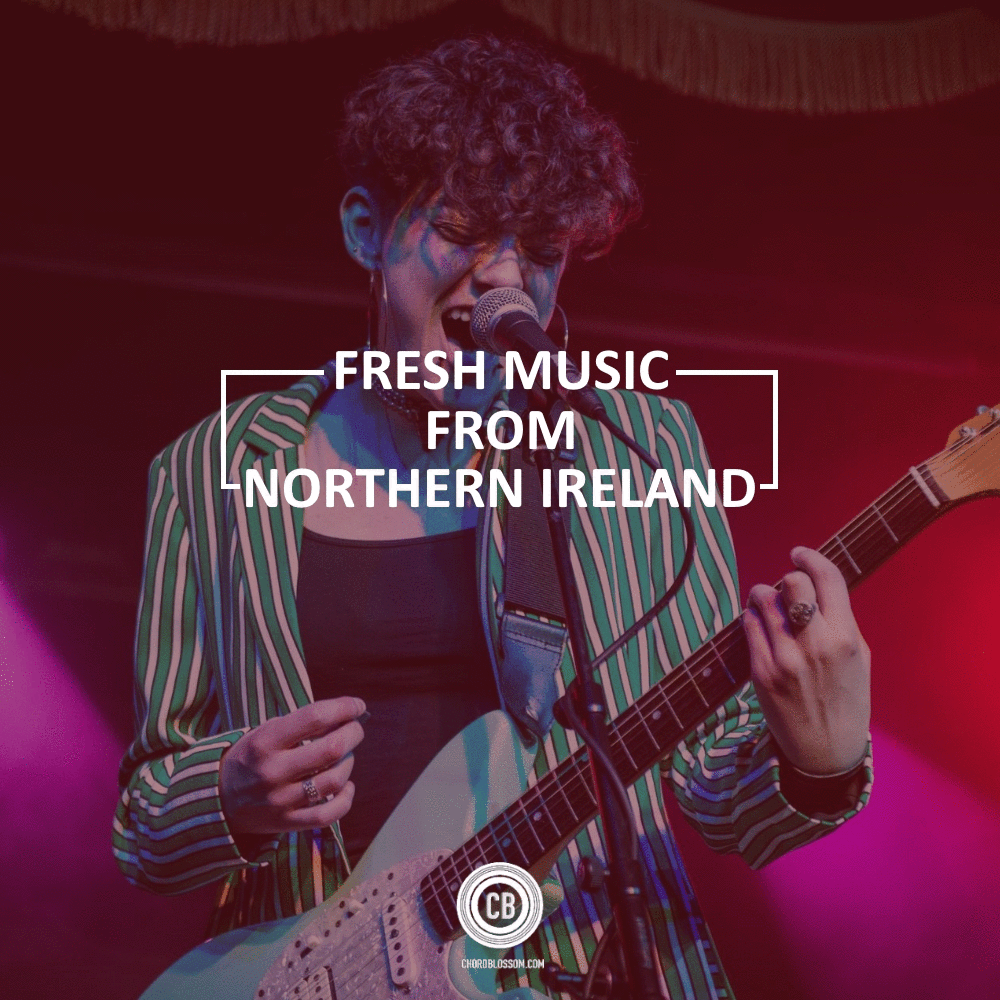“When the people shall have nothing more to eat, they will eat the rich.”
– Jean-Jacques Rousseau
“Itch, twitch and eat the rich.”
– ‘Beehive’, Jackknifed Juggernaut
We’re sitting in the living room of a student house. Wrapped up in all-black clothing with only his clean-shaven head exposed, frontman of Jackknifed Juggernaut Iain is nothing short of charismatic, accenting casual conversation with flowing hand gestures and witty jokes. Above us is a ‘Happy Birthday!’ banner. No one remembers when it’s from.
I was keen to see how the emerging spoken-word, self-coined ‘bastard-punk’ artist responds to our Northern Irish punk heritage and the current politics of the island. On the wall opposite is a huge collage of sentimental photographs with friends. I’m told a section is to be used for forthcoming album art.
Lyrically, the three-piece sum up the anaesthetizing effect of modern life and politics. Frontman Iain charts influences from Gil-Scott Heron to Stiff Little Fingers, with the distinctive sound placing us somewhere between Arab Strap and Sleaford Mods.
In the wake of releasing their first full-length studio recordings, I sat down with Iain to talk through influence, process and the place of punk in modern music. We jump straight in.
►So, what are your aims as a band?
Entirely political, I see it as a direct medium into politics. Something that can be directly used, not like the Sun newspaper – not like things that people don’t read anymore – it can create ideas and send them out to people, and people hear them. That’s the medium that I want to make use of.
►Was there ever an alternative medium, or was it always music?
For me personally – I have a background in poetry. I’ve always wrote, and seen, and music isn’t like fine art, where it’s put in museums. Where rich people go look at it, and maybe buy it depending on how much they want to spend. Yeah, there isn’t another medium that I personally see as working, for me.
►Obviously as well (Jackknifed Juggernaut) is collaborative. There’s you, Chris the bassist and Andrew is your drummer. Do they share the same sort of political sentiments?
The lyrics are entirely of my creation and I take full control of that, and I don’t play any musical instrument. So it’s entirely with the two that I’m able to express my own opinions of things. What I read and what I come into contact with, and I take full control of that myself. So I don’t say that the other band members are one hundred percent behind me on everything that I happen to ever think. But obviously, they aren’t members of the alt-right. (Laughing) they aren’t neo-Nazis. So we’re on the same wavelength.
►The music – the instrumentals as well, they’re a little more on the experimental side. Is that another focus in the music?
Yeah, take out the politics from it and music is, I always find, the most interesting stuff is the stuff that’s experimental. The stuff that doesn’t sound like anything else out there. And that was definitely when we first started the band, well after the first day and first practice, we felt the sound was different to what we’ve heard before – certainly in Belfast. Just from a musical point of view, we want to make something that’s interesting. It’s not just poetry, not just something that’s written on a page, it’s how it’s delivered and how it actually sounds, moves and flows. That’s as important as the political side, as how the actual written words on paper are.
►And then you have our punk heritage; you have Ash, The Defects, Stiff Little Fingers, obviously there’s going to be that influence there, but do you feel that those messages are still relevant now?
Yeah, the reason undoubtedly, and I pinpoint this very succinctly, is Alternative Ulster – that was the reason I wanted to start a band. The first song I ever wrote was Naïve with the line in it:
“It’s 2016 and we still scream Alternative Ulster in my living room”
That was what, late 70s? And it’s 2016. We’re talking 30, maybe 40 years later. I feel like there isn’t a lot of political music about. The Troubles were a very political time, so chaotic, and now we’re at this sort of after-period that is just stale, and everybody is just sort of accepting how bad things are and that it’s going to stay like this forever. ‘It’s not as bad as the Troubles, it’s something a little bit better.
It’s not Trump, it’s Hilary.’ You know, and we’re just happily sitting in it. I refuse to accept that. What energized me about Northern Ireland and about hopefulness on this whole island, were songs like Alternative Ulster and I feel like that music, that medium, works so well for me, and that’s what I want to make myself. Things that are similar. But obviously the ‘punk’, I see hip hop, reggae and lots of (genres) are very much on the same wavelength and I see hip hop as being much more of a modern style of music that really works, that really gets to people and is much more effective than the punk that has come before. I see it as the modern version of the punk that we saw in the 70s and 80s.
►So how does the typical creative process flow for you, what’s the first step?
I just write. Whether it’s listening to hip-hop music or anything, I just write. And that’s definitely going back to what it was before when all I did was write. And then it’s get into the studio, get into a practice space and I start speaking, Andrew starts drumming, Chris starts playing the bass and we just keep going. It flows directly from there. Chris and Andrew both study music. We’re all twenty now, they’re experienced musicians and I’m not at all. I have no experience, this is the first ever thing that I’ve actually been involved in, that was actually musical. They’re both experienced and talented in improvisation, as musicians. So, (laughing) they’re useful in that respect.
►I would get a very strong sense of frustration from the music, more so than angst or anger. There’s definitely a lot of pent up energy and a lot of thoughts being released. Do you find it to be a bit more of a cathartic experience?
It’s undoubtedly an outlet, undoubtedly. What do you do when you feel you’re powerless? Do you just wait? Every few years and vote in an election for the party that is the most like what I want, and obviously they’ll never get in. That’s the option every time. I’m originally from Ballynahinch and it’s DUP, DUP-always. I’m sitting there just like, if Green Party happens to run there I’ll throw them a vote and I’ll be one of two hundred people who vote for the Green Party in that constituency. It’s useless. And if that’s the only outlet, that’s the only way we can enact political change, then we’re powerless and we’re permanently in this state and we will never get out of it. There has to be another way, there has to be another root to getting there. And I don’t see just hoping it’ll all come about by yourself, just sitting and just hoping by the next election you’ll have a better option or that somebody else will have happened to come into power. You have to get out and do it yourself, you have to at least feel you are doing something.
►So music’s a bit more active?
It’s more accessible to people. It’s under 50% voter turnout in Northern Ireland, I don’t blame them, why would you vote why would you do anything. Music is not something you go and look at in a gallery or… especially not the youth, the youth don’t buy newspapers anymore. A huge amount of the youth don’t go to art galleries. You know, music is there and it’s in your face and it’s more accessible to everybody. A huge amount of the population listens to music daily, very regularly. Emotions, feelings and frustrations, all of it can really be felt in music much more than say, your opinion piece in The Guardian. I would say opinion piece in The Sun but I don’t think any of those exist.
Music is for the people when the government, when the establishment, isn’t for the people.
Listen to the first stream of Jackknifed Juggernaut’s politically-charged, agitator grit hop ‘Arlene Foster 1979’ here:
http://soundcloud.com/jackknifedbelfast/79a/s-9tN06

